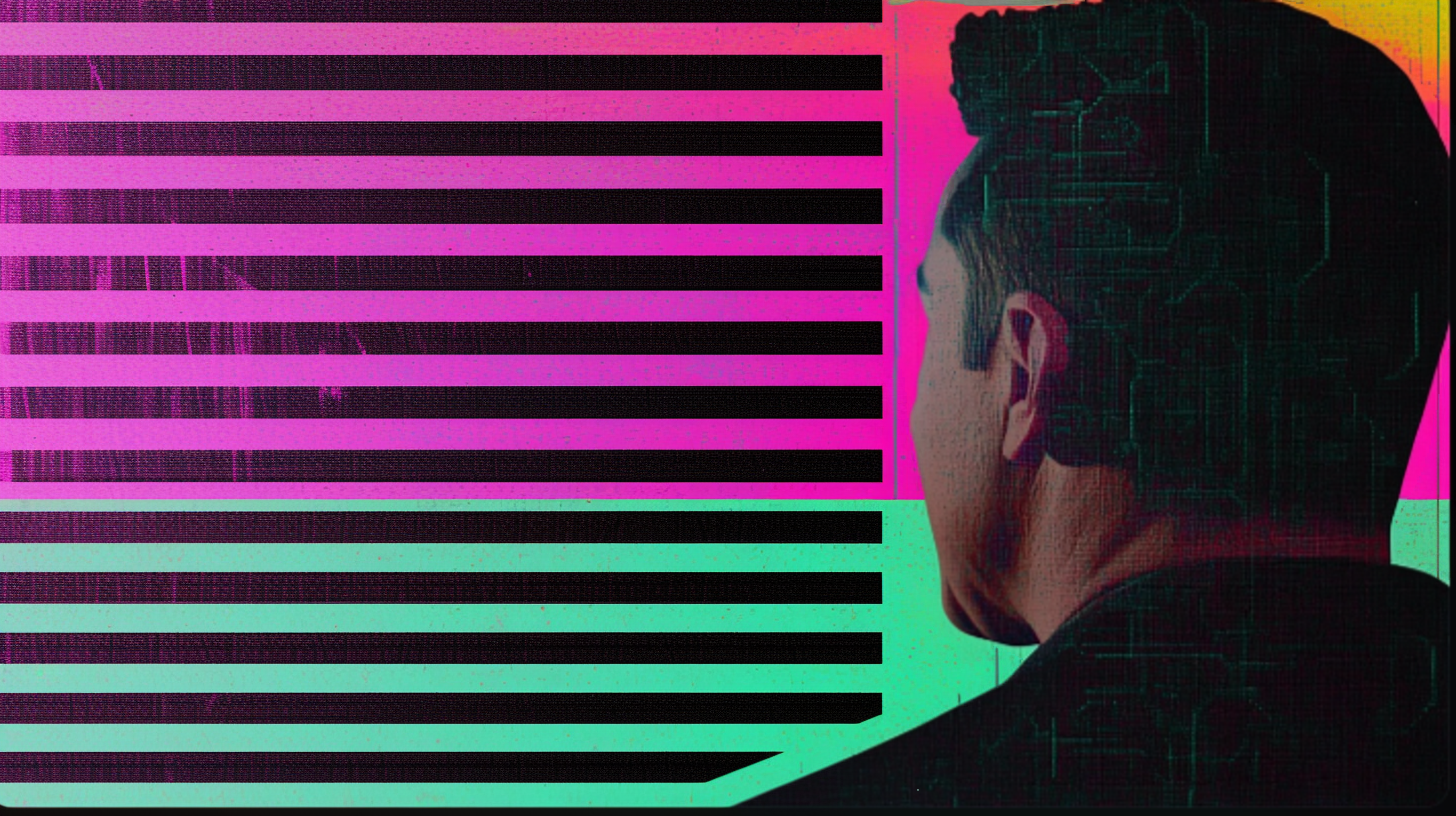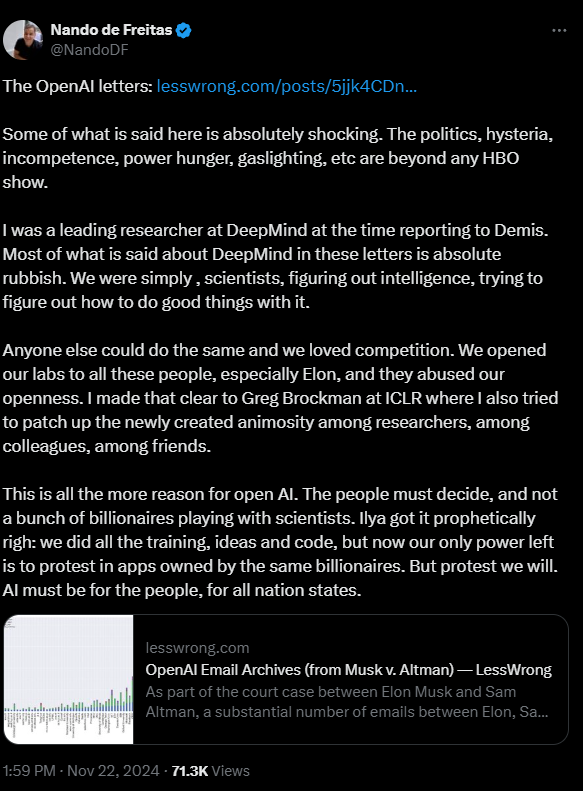Elon Musk vs. OpenAI is "beyond any HBO show," says former Deepmind researcher

Update –
- Added Nando de Freitas statement
Update November 23, 2024:
Former top DeepMind researcher Nando de Freitas has strongly denied the allegations against DeepMind made in the email exchange between OpenAI executives and Elon Musk.
"Most of what is said about DeepMind in these letters is absolute rubbish. We were simply scientists, figuring out intelligence, trying to figure out how to do good things with it," writes de Freitas.
The researcher, who reported directly to DeepMind CEO Demis Hassabis at the time, accuses Musk and the OpenAI leadership of abusing DeepMind's openness: "We opened our labs to all these people, especially Elon, and they abused our openness."
De Freitas sees the now-published emails as an argument for more openness in AI development: "The people must decide, and not a bunch of billionaires playing with scientists."
According to de Freitas, Ilya Sutskever got it prophetically right: researchers did all the training, ideas, and code, but now their only power left is to protest in apps owned by the same billionaires.
"But protest we will. AI must be for the people, for all nation states," writes de Freitas.

De Freitas spent more than a decade at Deepmind as AL Lead and Senior AI Director, and is now VP at Microsoft AI, OpenAI's largest and most important partner company.
Original article from November 17, 2024:
Elon Musk didn't want OpenAI to seem like Microsoft's "marketing bitch"
Newly released emails from the legal conflict between Elon Musk and OpenAI CEO Sam Altman show what led to Musk's departure from the AI company he helped create.
The correspondence shows that Musk was driven from the outset by concerns that Google and its AI lab DeepMind could assume too dominant a position.
"Deepmind is causing me extreme mental stress. If they win, it will be really bad news with their one mind to rule the world philosophy," Musk wrote to OpenAI co-founder Greg Brockman in February 2016.
Musk and Altman founded OpenAI at the end of 2015 as a non-profit organization with the aim of developing artificial intelligence for the benefit of humanity.
"If it's going to happen anyway, it seems like it would be good for someone other than Google to do it first," Sam Altman wrote to Elon Musk in May 2015.
Musk didn't want OpenAI to look like Microsoft's "marketing bitch"
The first tensions arose in September 2016, when OpenAI was negotiating with Microsoft for computing resources. Microsoft offered $60 million worth of computing power for $10 million, but wanted OpenAI to promote Microsoft's CNTK AI platform in exchange.
In the end, the parties agreed on a payment of 50 million dollars with no further conditions. Musk agreed if Microsoft would not use the deal for PR purposes: "Would be worth way more than $50M not to seem like Microsoft's marketing bitch," Musk wrote to OpenAI's then-chief of staff Sam Teller.
Sutskever and Brockman criticize Musk and Altman's quest for power
The situation came to a head in 2017 when the OpenAI leadership around Ilya Sutskever and Greg Brockman expressed concerns in an email entitled "Honest Thoughts" that Musk could gain "unilateral absolute control" over a potential artificial general intelligence (AGI) as CEO of a planned for-profit subsidiary.
According to OpenAI, Musk wanted majority stock ownership, initial control of the board of directors, and the position of CEO if the company converted to a for-profit structure.
"You stated that you don't want to control the final AGI, but during this negotiation, you've shown to us that absolute control is extremely important to you," Sutskever and Brockman wrote. "We are concerned that as the company makes genuine progress towards AGI, you will choose to retain your absolute control of the company despite current intent to the contrary."
Musk, who had co-founded OpenAI specifically to prevent such power concentration, responded with an ultimatum: "Guys, I've had enough. This is the final straw. Either go do something on your own or continue with OpenAI as a nonprofit. I will no longer fund OpenAI until you have made a firm commitment to stay or I'm just being a fool who is essentially providing free funding for you to create a startup. Discussions are over."
Brockman and Sutskever were also suspicious of Sam Altman's ambitions to become CEO. "We don't understand why the CEO title is so important to you. Your stated reasons have changed, and it's hard to really understand what's driving it," they wrote, asking Altman how a CEO position at OpenAI would "connect to your political goals."
Sutskever was involved in Altman's temporary ouster in November 2024, and left the company in May 2024 to launch his own AI startup focused on safe superintelligence. Brockman recently returned to work at OpenAI after a three-month break.
Final split
In early 2018, Musk ramped up his criticism, saying that OpenAI was on a "path to certain failure relative to Google," asking for "immediate and dramatic action." He dismissed Altman's idea of an initial coin offering (ICO) as a "massive loss of credibility." As a last resort, he suggested "a major expansion of OpenAI and a major expansion of Tesla AI. Perhaps both simultaneously."
"To be clear, I have a lot of respect for your abilities and accomplishments, but I am not happy with how things have been managed. That is why I have had trouble engaging with OpenAI in recent months. Either we fix things and my engagement increases a lot or we don’t and I will drop to near zero and publicly reduce my association," Musk wrote.
The talks failed, and in February 2018, Musk resigned from OpenAI's board. At the time, OpenAI explained that Musk's resignation had to do with avoiding conflicts of interest in his role as CEO of Tesla. Given the numerous tensions between the parties, this explanation now seems highly sanitized.
When OpenAI formed a for-profit arm in March 2019 to invest billions in data centers and talent, there was renewed email contact between the parties. Musk stressed that the announcement of the restructuring should clearly state that he had no financial interest in OpenAI.
The tensions between Musk and OpenAI continue to this day. Musk is suing OpenAI over its shift to a for-profit model and claims Microsoft now controls the company. He has since started xAI, aiming to create what he calls the most powerful AI model by the end of 2024.
The emails emerged from court documents in the ongoing legal dispute between Musk and Altman, published as part of the proceedings and compiled by an author from the LessWrong platform.
AI News Without the Hype – Curated by Humans
As a THE DECODER subscriber, you get ad-free reading, our weekly AI newsletter, the exclusive "AI Radar" Frontier Report 6× per year, access to comments, and our complete archive.
Subscribe nowAI news without the hype
Curated by humans.
- Over 20 percent launch discount.
- Read without distractions – no Google ads.
- Access to comments and community discussions.
- Weekly AI newsletter.
- 6 times a year: “AI Radar” – deep dives on key AI topics.
- Up to 25 % off on KI Pro online events.
- Access to our full ten-year archive.
- Get the latest AI news from The Decoder.